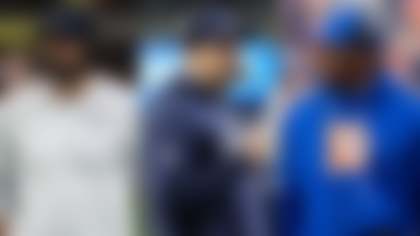When I was in Valley Ranch last week visiting the Cowboys, I was able to get in a brief chat with linebacker Keith Brooking, a guy I've covered for years and have tremendous respect for. He's honest and genuine and someone I know who will shoot it to me straight.
So I asked Brooking about his former teammate in Atlanta, Michael Vick, who, at the time, had just been named the Eagles' starting quarterback.
"I'm happy for him; I really am," Brooking said. "He's turned his life around, and it's just so good to see this happening for him."
Brooking, like me, said the things that have impressed him most about Vick Part II were Vick's maturity and humility and how he is throwing the ball with such precision. The Eagles' lefty has completed 61 percent of his passes and has a passer rating of 110.2.
The irony is that Bobby Petrino, who was hired to coach Vick in 2007 but never got that opportunity because Vick went to jail on dogfighting charges, said he could get Vick to reach that completion percentage. It was a running joke for weeks. Under Jim Mora, who coached Vick from 2004-2006, Atlanta led the league in rushing twice -- thanks to Vick -- and finished last or close to it in passing each season.
Personal grudge matchs
Donovan McNabb facing his former team isn't all that unusual in the annals of pro football. Check out this list of players getting a chance to show up their old team. **More ...**
Mora said Vick should never be measured by passer-rating numbers. He is now.
Vick's current coach, Andy Reid, said Vick's big arm is more accurate because he's worked at it and has the receivers to help him. I've talked to other coaches who said Vick is finally in an ideal system for his talents.
Since I tapped all of Vick's NFL coaches in some form, I decided to seek out Vick's first coach, Dan Reeves, who selected him with the No. 1 overall pick in 2001. Reeves was the one coach Vick had, until now, who really believed Vick could be a great passer as well as runner. Under Reeves, Vick had a career best passing season in 2002, throwing for 2,936 yards. He's never reached 2,500 passing yards since.
Reeves was fired in 2003 before he ever got to fully develop Vick, but he still keeps in touch with him and said that he has watched every game Vick has played this season. Reeves said what Vick has done is a result of the work he put in this offseason and in training camp.
"Last year with the Eagles, he told me that at practice he was doing a lot of scout-team work so he said he was going to try and get better throwing the ball by (emulating) other quarterbacks," Reeves said. "The majority of packages that they had for him in the offense were Wildcat stuff, so he did a good job on scout team and in practice working to get better as a passer.
"This offseason, when he was working as the backup to Kolb, I'm sure he got a lot more reps in the offense. He's really looked good running the offense."
Reid said Vick has been diligent in adhering to a passing "platform," in which he progresses through stages of the passing game. Vick is keeping his eyes downfield when he moves out of the pocket and his mechanics are truer. The reptitions could also be helping Vick.
In his final three seasons with the Falcons, Vick averaged less than 24 throws a game. There were times when Atlanta's passing attempts didn't reach 20 -- with good reason. The Falcons ran the ball so well, with Vick eclipsing 1,000 yards in 2006. In fairness, some of those runs came on passing plays and Vick opted to run either because he felt that was the best option or to flee from oncoming rushers behind a run-first, zone-blocking offensive line.
His infrequency of throws highlighted his misses. So did his accuracy problems. Vick didn't put in the time in the offseason or during the season that he has now. To note, in 2002 under Reeves, Vick averaged 28 passes per game and hit his high mark in yards.
Reid's version of the West Coast offense also seems to fit Vick because he's able to let loose on the deep ball and get into a rhythm with short and mid-range throws. It's the same system that Vick's Redskins' counterpart this week, Donovan McNabb, ran for 11 seasons, posting Hall of Fame-like numbers and getting to a Super Bowl.
Like McNabb, Reid said this week that Vick is putting his personality into the scheme, which is why it's been successful. The plan was for Kevin Kolb's identity to be imprinted on things by now, but when he sustained a concussion in Week 1, he opened the door for Vick -- and those who know Vick knew that's all the daylight he needed, because he was on a mission to become a starter again.
In 10 quarters, Vick has thrown six touchdowns and run for another, completed 54 of 89 passes for 750 yards and has yet to throw an interception. Reeves said Vick's stats are notable, but they aren't the barometers of what he brings.
"The No. 1 thing for a quarterback is winning," Reeves said. "He has always been a winner, and he was good at getting you in position to win because he was going to move the chains. He is very dangerous in the red zone -- really dangerous. He can throw the heck out of the football. He has such a strong arm on top of a quick release. It goes from Point A to Point B pretty fast. That's why he can hold onto the ball a little longer, especially when he's on the move."
As for Reid's decision to start Vick, Reeves said it had to entail more than just Vick playing well and the team winning.
"When I made those decisions in the past and when coaches make them now you better be making the same ones players would make," Reeves added. "In my opinion he probably went with Mike Vick because he sensed the players felt like he was the best starting quarterback. You work your (rear end) off every week, you want to have a chance to win on Sundays so when you make that decision, it would be unusual if that decision was one players don't believe in."
Johnson up to the task?
In an interesting side note, the quarterbacks coach Reeves hired to bring Vick and his receivers along in 2002 was Mike Johnson, the former quarterbacks coach in San Francisco who was promoted to offensive coordinator Monday when head coach Mike Singletary fired Jimmy Raye.
Reeves said it's not easy to make such a transition at this point of the process but added that Johnson's relationship with quarterback Alex Smith and Johnson's personality should help the process.
"Mike had a grasp not only of the passing game but the running game and that's what a play-caller does," Reeves said. "When you're calling plays, you're hoping they would be the same plays the quarterback would call. With him working with quarterbacks it should help him have a feel for what the quarterback wants and like according to the game play. I'm sure Mike's excited. It's a great opportunity for him."



